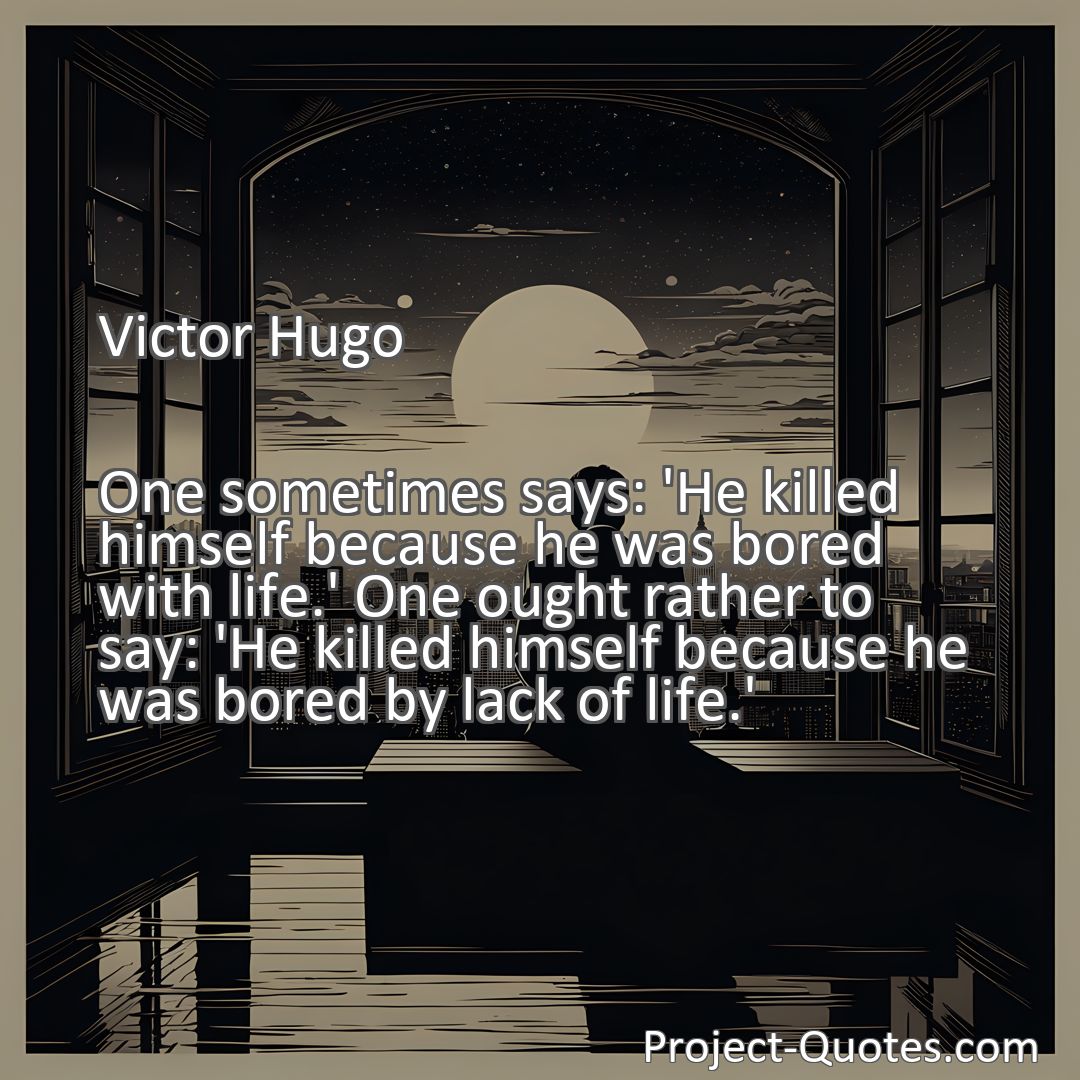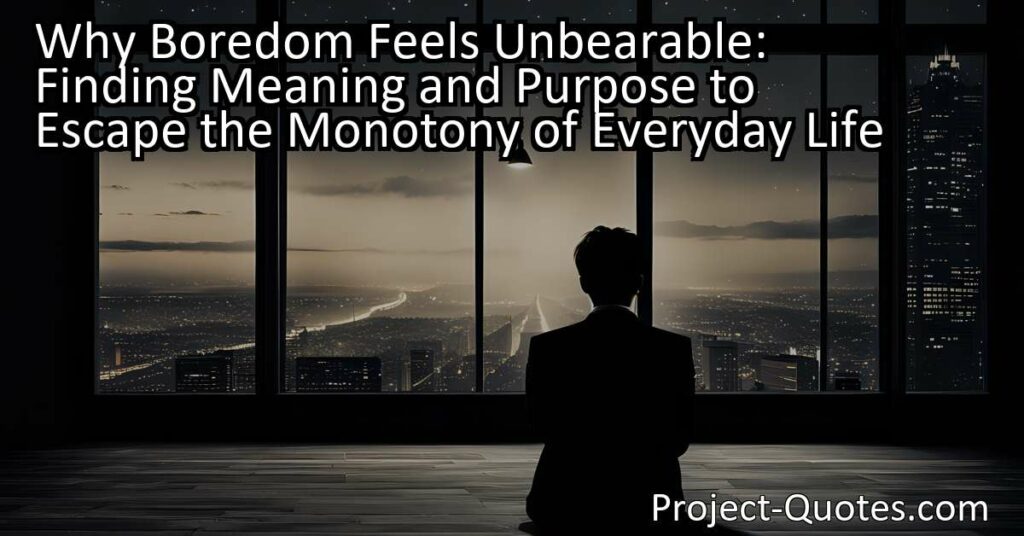One sometimes says: ‘He killed himself because he was bored with life.’ One ought rather to say: ‘He killed himself because he was bored by lack of life.’
Victor Hugo
Feeling bored every day can make life seem dull and repetitive. Victor Hugo suggests that this lack of meaning and purpose can lead people to extreme measures. By finding meaning and seeking out meaningful experiences, we can escape the monotony and bring vibrancy back into our lives.
Table of Contents
- 1 One sometimes says: ‘He killed himself because he was bored with life.’ One ought rather to say: ‘He killed himself because he was bored by lack of life.’
- 2 Victor Hugo
- 3 Meaning of Quote – One sometimes says: ‘He killed himself because he was bored with life.’ One ought rather to say: ‘He killed himself because he was bored by lack of life.’
- 4 Freely Shareable Quote Image
- 5 Related
Meaning of Quote – One sometimes says: ‘He killed himself because he was bored with life.’ One ought rather to say: ‘He killed himself because he was bored by lack of life.’
Have you ever felt so bored that it seemed like life itself had lost all its flavor, like every day felt like a dull repetition of the one before? If so, you may have wondered why some people, like the author Victor Hugo suggests, might go to extreme lengths to escape this oppressive emptiness.
The quote by Victor Hugo invites us to reflect on the idea that boredom can reach such depths that it becomes unbearable, leading some individuals to tragic decisions. He challenges us to reframe our understanding of suicide as a result of boredom, suggesting that it is not life itself that saps the joy out of existence, but rather the lack of meaningful experiences.
Boredom is something we all experience from time to time. As human beings, we seek novelty, excitement, and purpose in our lives. We yearn for those moments that make us feel alive, that ignite our passions and give us a reason to get out of bed in the morning. However, when these moments of vitality become sparse, our existence can start to feel monotonous, like a never-ending cycle of triviality.
But why does this lack of life, as Hugo calls it, lead some individuals to consider such a desperate act as taking their own lives? The answer lies in the fundamental human need for meaning. Without a sense of purpose, life can feel devoid of value and significance. It is in this void that boredom thrives, slowly wearing away at our spirit, eroding our ability to find joy in the everyday.
For a person grappling with the weight of boredom, life becomes an empty canvas, devoid of colors and textures. Every interaction feels like a scripted dialogue, devoid of genuine connection. Activities that once brought pleasure now feel mundane and repetitive. And as the days blend together, it becomes increasingly difficult to see a way out. It is at this intersection of despondency and apathy that the idea of ending one’s life may emerge as a seemingly viable solution.
But do we truly understand the toll that boredom can take on a person’s mental well-being? Boredom is not merely the result of having nothing to do; it is a complex state of mind that affects our cognitive and emotional functioning. Research has shown that chronic boredom can lead to a host of negative outcomes, including anxiety, depression, and increased risk-taking behaviors. It can also contribute to a sense of alienation, as individuals withdraw from social interactions in search of stimulation that seems perpetually out of reach.
Moreover, the impact of boredom extends beyond the individual experiencing it. In a society plagued by widespread boredom, we risk creating a collective malaise, where people feel detached from the world around them. This detachment can hinder our ability to empathize with others, stifling creativity, innovation, and cooperation. Ultimately, a lack of engagement with life can have far-reaching consequences, both for individuals and the wider community.
So, how can we combat this pervasive boredom and inject more life into our existence? The answer may lie in cultivating a sense of purpose and seeking out meaningful experiences. Purpose can provide direction, giving our lives a sense of meaning even in the face of adversity. It allows us to find value in the simple moments, to appreciate the beauty of the world around us, and to actively participate in shaping our own destinies.
Meaningful experiences, on the other hand, can come in various forms. They can be found in relationships, creative pursuits, engaging in hobbies, or pursuing personal goals. By actively seeking out these experiences, we invite novelty and excitement back into our lives. We challenge ourselves to step out of our comfort zones, to explore new territories, and to connect with others on a deeper level.
Additionally, it is essential to recognize that boredom is not an inherent flaw in life itself but rather a product of our own perceptions and attitudes. By reframing the way we approach boredom, we can see it as an opportunity for growth and self-discovery. Instead of succumbing to its paralyzing grip, we can use it as a catalyst for change, a wake-up call to reassess our priorities and pursue the things that genuinely ignite our passion.
In conclusion, the quote by Victor Hugo serves as a reminder that it is not life itself that causes us to feel bored but rather the lack of meaning and purpose that drains the vibrancy from our existence. Boredom can have devastating effects on our mental well-being, leading some individuals to contemplate desperate measures. However, by cultivating a sense of purpose and seeking out meaningful experiences, we can infuse our lives with the vitality and richness they deserve.
I hope this quote inspired image brings you hope and peace. Share it with someone who needs it today!


